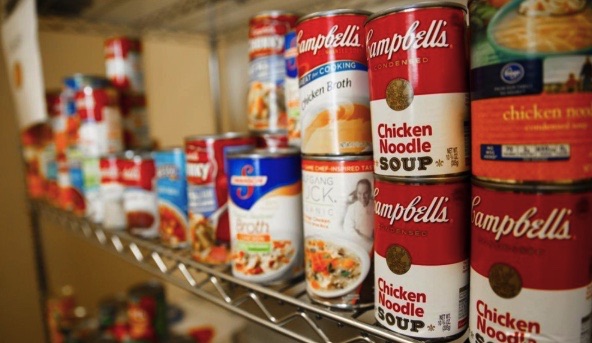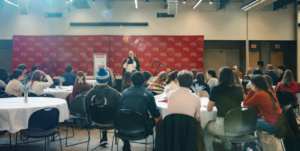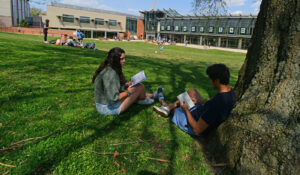Campus Ministry’s Food Pantry

By Katie Van Lew
Nationwide, college students encounter food insecurity on a daily basis. In order to address the prevalence of food insecurity on Catholic University’s campus, Campus Ministry plans to implement a permanent Food Pantry which will be instituted in the Spring of 2020.
Frequently, people are food insecure, and not always aware of it. Students have acclimated to the idea that going hungry is apart of the archetypal life of a “broke college student,” but it is quite the contrary.
“Food insecurity is different than to be starving,” said Kara Feidelseit, a volunteer of the Americorps Vista who is doing a year of service with Campus Ministry. “It is about having inadequate access to nutritious food. You are not eating enough during the day, and when you do eat, it may be cheap non-nutritious food.”
To combat food insecurity, Catholic University’s Campus Ministry is implementing a permanent food pantry by the end of the Spring semester in 2020. While awaiting the much-anticipated food pantry in the spring, Campus Ministry will be hosting pop-up food pantries for the duration of the Fall semester. These pantries are sourced by Campus Ministry’s budget, as well as the generous donations from the community. The Pop-Up Food Pantries will be located at three different locations with the goal of reaching all students and faculty in need. The three locations included are the Pryz 351, Pangborn 328, and the Dufour Center. The idea of setting up pantries at diverse locations allows for all students to address their food insecurity in a private setting.
At Catholic University, freshmen and sophomores living on campus are required to have an all-access meal plan. While students with a meal plan are guaranteed three meals a day, students without a meal plan are not given the opportunity to have nutritious meals provided. People without meal plans, such as students residing off-campus and faculty members, have to rely heavily on their own source of income to pay for their groceries and meals; therefore, cheap food may be favored because of the budget effectiveness appeal. This becomes problematic for members of the community because food that is cheap is not necessarily healthy. The proposition of the Food Pantry on campus will ensure that all students and faculty alike will be provided with fruits, vegetables, protein, and other necessary nutrients.
During the temporary “pop-up” pantries conducted last year, Feidelseit surveyed forty-three students and faculty members of the Catholic University community. The most pressing question inquired, “Did you ever not eat for a whole day because there was not enough money or food?” Out of 43 respondents, 40% answered, “Yes.”
“By having it in multiple locations at different times we are trying to reach a lot of people,” said Feidelseit.
With pantries located conveniently near the metro, students and faculty commuting will have easy access to food upon entering or leaving the campus.
The food pantry will have non-perishable goods such as canned soup, oatmeal, fruit cups, and more nutritious foods available to students at their leisure. In addition, the pantry will offer a variety of toiletries for students in need of proper hygiene products. It will be open to all members of Catholic University, with no questions asked. The food pantry is a great proposition to solve the food insecurity on campus, and hopefully, the initiative will inspire other campuses to implement their own food pantries.The first Pop-Up Food Pantry is scheduled for Thursday, September 19th in the Pryz 351 from 10 am – 2 pm. Those interested in volunteering to help with future food pantries and food drives are encouraged to email [email protected].








